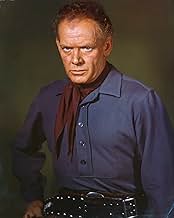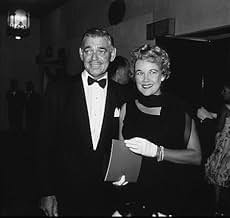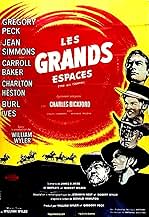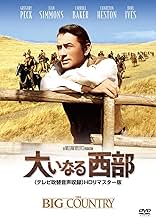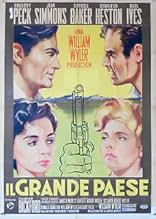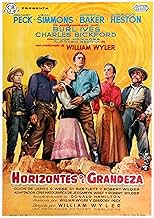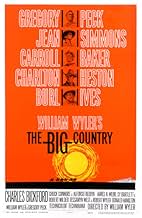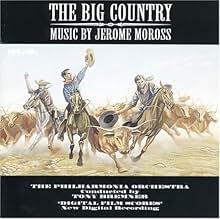A New England sea captain in the 1880s arrives at his fiancée's sprawling Texas ranch, where he becomes embroiled in a feud between two families over a valuable patch of land.A New England sea captain in the 1880s arrives at his fiancée's sprawling Texas ranch, where he becomes embroiled in a feud between two families over a valuable patch of land.A New England sea captain in the 1880s arrives at his fiancée's sprawling Texas ranch, where he becomes embroiled in a feud between two families over a valuable patch of land.
- Won 1 Oscar
- 3 wins & 5 nominations total
Slim Talbot
- Terrill Cowboy
- (as Jay Slim Talbot)
Richard Alexander
- Party Guest
- (uncredited)
Rudy Bowman
- Party Guest
- (uncredited)
Featured reviews
As several characters state in the film, "This is a big country" and THIS is a BIG MOVIE. It screams out for widescreen viewing. Many of the characters are largely and broadly drawn with big strokes (stubborn Peck, fiery Baker, resentful Heston, righteous Simmons, imperious Bickford, cantankerous Ives and slithering Connors) yet they all are dwarfed by the huge landscape. Tall men, horses, trees and houses are all presented as so many ants on an ant hill in many of the images. The film has a compelling story and intriguing interpersonal relationships and rivalries which are all enhanced by this larger than life approach. The landscape is sometimes awe-inspiring, notably in the Blanco Canyon scenes near the end of the film. Peck is appropriately straight-laced and uncomfortable in this rough & tumble setting, lovely Simmons is a likable heroine and Baker is an effective daddy's girl with misplaced affections. Connors acquits himself very nicely as a thoroughly detestable punk. Heston comes off extremely strong in this film. He's completely at home and was probably never more handsome (check out the scene in which he's roused from his bed by Peck!) He makes the most out of this secondary role. Bickford and Oscar-winning Ives make a great pair of adversaries...almost makes one wish for a prequel to see what got these two so riled up (but today's filmmakers couldn't be counted upon to do it in a tasteful, classy way.) Memorable scenes include the taunting of Peck by Connors and his brothers, Ives grand entrance into Bickford's house and an almost legendary fight scene between Heston and Peck. All of the above are raised to an even higher plane of excellence by what must be one of the greatest musical scores in film history (western or otherwise.) Jerome Moross composed several themes (the opening title is the best known) which put this film into a whole new category of enjoyment. The score stands alone as a beautiful listening experience and paired with the images in this film, it is amazing. It occasionally seems intrusive, yet knows when to keep quiet as well. The Oscar that year went to Tiompkin's "Old Man and the Sea", but it seems astonishing that anything could have bested this score. The film's only real flaw is slight overlength, but nothing really stands out as aching to be cut! Maybe just bits and pieces....but, really, the story just takes it's time and builds to some stirring moments.
I'm always appalled at how little William Wyler I've seen. I adore The Best Years of Our Lives and Roman Holiday, but Ben-Hur is underwhelming. Now with The Big Country winning my heart, he really deserves better. I'm a sucker for a good subversive Western. The myth of the American frontier in cinema is fascinating to me and any film that develops the ideas inherently has my attention. The Big Country is credited as the first pacifist Western as Gregory Peck refuses to fight until the last moment or acknowledge the seriousness of any conflict. He's an unconventional hero. One who teeters a line of cowardice. But this just makes him all the more endearing as a three dimensional character. Granted, the film has its caricature characters on the side, but the script has such a dry wit. Burt Ives won an Oscar for his role and coming in an hour into the film, there wasn't much spotlight left to share, but he certainly has his moments. It's a grand epic in visuals and length that I easily sunk into. It's a big country alright. Also boasts one of the best scores I've ever heard. Can't believe it's not considered a greater classic.
8/10
8/10
10alecwest
As a rule, I don't like westerns. This isn't because I'm a city slicker (though now, I do live in a city). I grew up in rural Eastern Oregon where "real" cowboys still herd their cattle through the center of town in John Day, Oregon. My stepfather owned a 10,170 acre cattle ranch. After being raised among "real" cowboys, the Hollywood versions tend to leave me flat. The Big Country was an exception.
Jim McKay (Gregory Peck) introduced us to a different kind of man, far different than most stereotypical men of the Wild West. If I were to compare McKay's character to any other film character, it would be Ghandi. He's a man who doesn't feel obliged to seek the approval of others ... a man who believes that violence doesn't need to be used to solve problems. His secret ride of Old Thunder, making Ramon (Alfonso Bedoya) swear to keep quiet regardless of the outcome, set the tone for McKay's character. His later secret fight with Steve Leech (Charleton Heston), making him swear to keep quiet regardless of the outcome, cemented that tone. This was a REAL man whose opinion of himself was not dependent upon anyone else's opinion ... in stark contrast to anyone else in the film outside of Julie Maragon (Jean Simmons). As Ramon said, "Such a man is very rare."
Outside of McKay, my #2 favorite character in the film was Rufus Hannassey (Burl Ives). I found nothing about him distasteful considering he was a character whose back was against the wall ... whose livelihood was threatened. The things he did make perfect sense in such a situation. His only flaw was his obvious poor parenthood. He really blew it with Buck (Chuck Connors) and Buck's siblings were of the same ilk.
I'm so glad that MGM/UA finally released the widescreen version in 2001. This is a film that deserves such a presence. It may not be playing in theaters anymore but seeing it in any other display size takes so much away from it. I've seen the pan/scan version before and will never go back.
One note. The full listing of writing credits for the film adaptation is lacking. "Ambush In Blanco Canyon," originally serialized in a magazine, was later novelized into "The Big Country" by Donald Hamilton ... and Hamilton also worked on the adaptation as well as Leon Uris ("Topaz," "Exodus," "Gunfight At the OK Corral," etc.).
This epic film was not lacking for anything. It had the best writers, the best actors, the best musical score, and the best scenery of any other film of its time ... western or otherwise. And the film remains one of my favorite films of all time.
Jim McKay (Gregory Peck) introduced us to a different kind of man, far different than most stereotypical men of the Wild West. If I were to compare McKay's character to any other film character, it would be Ghandi. He's a man who doesn't feel obliged to seek the approval of others ... a man who believes that violence doesn't need to be used to solve problems. His secret ride of Old Thunder, making Ramon (Alfonso Bedoya) swear to keep quiet regardless of the outcome, set the tone for McKay's character. His later secret fight with Steve Leech (Charleton Heston), making him swear to keep quiet regardless of the outcome, cemented that tone. This was a REAL man whose opinion of himself was not dependent upon anyone else's opinion ... in stark contrast to anyone else in the film outside of Julie Maragon (Jean Simmons). As Ramon said, "Such a man is very rare."
Outside of McKay, my #2 favorite character in the film was Rufus Hannassey (Burl Ives). I found nothing about him distasteful considering he was a character whose back was against the wall ... whose livelihood was threatened. The things he did make perfect sense in such a situation. His only flaw was his obvious poor parenthood. He really blew it with Buck (Chuck Connors) and Buck's siblings were of the same ilk.
I'm so glad that MGM/UA finally released the widescreen version in 2001. This is a film that deserves such a presence. It may not be playing in theaters anymore but seeing it in any other display size takes so much away from it. I've seen the pan/scan version before and will never go back.
One note. The full listing of writing credits for the film adaptation is lacking. "Ambush In Blanco Canyon," originally serialized in a magazine, was later novelized into "The Big Country" by Donald Hamilton ... and Hamilton also worked on the adaptation as well as Leon Uris ("Topaz," "Exodus," "Gunfight At the OK Corral," etc.).
This epic film was not lacking for anything. It had the best writers, the best actors, the best musical score, and the best scenery of any other film of its time ... western or otherwise. And the film remains one of my favorite films of all time.
The Big Country was passed over by the professional critics as being empty, ernest, and not enough sweep to be called a true epic. Well, I remember seeing The Big Country and was properly swept off my feet by the grand scale of the Big Country, the death feud between Burl Ives and Charles Bickford, the shaky and doomed romance between Gregory Peck and the spoiled Carroll Baker and the quiet understanding between Peck and the lovely Jean Simmons, but most of all, the thing that propelled me to see The Big Country over and over was the magnificant score by Jerome Moross. Sure, I could site many scores that have aided films to glory, Max Steiner for The Letter, Maurice Jarre for Lawrence of Arabia, Miklos Roza for an excellent score for a weak epic Land of the Pharaohs, and Hans Zimmer for an excellent score for a great epic Gladiator but I still say that for a western you can't get any better than the magnificant score for The Big Country. The sweep and majesty and the quiet moments of Jerome Moross's music sets the tone for this truly underated movie. United Artist released the music on LP and I wore mine out along with my neighbors complaints, I now own an excellent CD produced by SILVA SCREEN which I can't wear out. All in all see The Big Country on your big screen in Widescreen and give yourself a real treat. Who needs Giant?
Alec West said spoke well in his post about the movie. It is one of my favorite movies for similar reasons. I would only add that I have used the film to illustrate different male and female values and styles. In Jim and Leech, and Buck as well, we see quite different versions of maleness: their world-views and how they present themselves to others. The contrast between Terrill and Hannassay is another interesting study. Pat and Julie offer a couple wonderful contrasts of female ways of being in the world. As a therapist, I have seen present day versions of these characters' values and behaviors time and again. My favorite character is Jim, but the character of greatest interest to me is Steve Leech. I admire his loyalty and find his transformation through his interactions with McKay well drawn.
Did you know
- TriviaThen US President Dwight D. Eisenhower gave the movie four consecutive showings at the White House and called it "simply the best film ever made. My number one favorite film."
- GoofsAt the beginning of the film Peck's character James McKay is mocked for his wearing of a bowler hat, which the characters make out as something only an easterner would wear. This is in stark contrast with history where the bowler hat was one of the most popular styles in the old west, beating out the Stetson and the sombrero. It has even been referred to as "The Hat that Won the West".
- Quotes
Patricia Terrill: But if he loved me, why would he let me think he was a coward?
Julie Maragon: If you love him, why would you think it? How many times does a man have to win you?
- ConnectionsEdited into Bass on Titles (1982)
- How long is The Big Country?Powered by Alexa
Details
- Runtime
- 2h 46m(166 min)
- Color
Contribute to this page
Suggest an edit or add missing content


